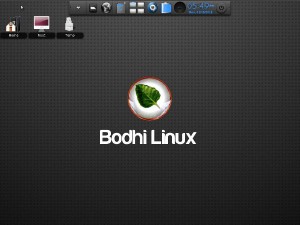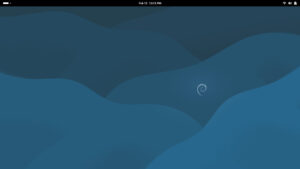After two years of development, the stable version of the latest and greatest version of Bodhi Linux, 3.0.0, was released last month. There’s little doubt that loyal users breathed a sigh of relief with the release, as there had been some question about whether the distro would continue after project founder Jeff Hoogland briefly resigned in September, saying he no longer had the time required by his duties to the project. The good news was that he continued to work with the development team, and in January returned in his old role as lead developer. The long awaited new Bodhi was released less than a month later.

According to Hoogland, the new version of Bodhi is being well received, both by old users updating their systems and by new users giving the operating system a try for the first time.
“It is hard to gauge exactly how many users we have as we do not implement any form of user tracking in Bodhi, and we have no intention of doing so,” he said in a recent email exchange. “We saw our fairly normal spike in downloads with the new release, and bandwidth on our package server since early February has been nearly double what it was in the few months previous when development was slow. Past that, our community forums have been picking up in traffic again, which is lovely, both with brand new users making accounts and previous users returning for the final release of 3.0.0.”
Like many Linux distros, the user base is diverse, with users using the OS to meet specific needs which vary from user to user. “We have a pretty large range of people who find their way to Bodhi,” Hoogland explained. “From folks who are coming from Ubuntu/Linux Mint looking for something lighter, to Arch Linux users looking for something quick and easy to setup on a relative’s computer that doesn’t come with a pile of bloat by default. Our Chromebook image has also started drawing in a fair number of folks who are completely new to Linux as a desktop operating system.”
The Chromebook image is a special edition of Bodhi designed to run on the popular and inexpensive laptops being offered by the major OEMs with Google’s cloud-centric Chrome OS installed. I asked Hoogland how the Chromebook edition differed from the other Bodhi images.
“There are two things that currently prompt the special ISO image for Chromebooks,” he replied. “The first is that most Chromebook hardware requires special kernel modules with kernels previous to 3.17; this ISO image contains those additional kernel modules. The second change is that the keyboard on Chromebooks is different than a typical laptop. The Enlightenment profile present on the Chromebook disc has special keybindings to make the Chromebook keyboard fully functional. These keybindings would cause some conflicts on a standard laptop keyboard.”
In addition to the Chromebook edition, Bodhi also offers a special Legacy edition designed for users of older hardware, which we wrote about a few weeks back on FOSS Force. Hoogland said that offering this special build, which will be supported throughout the 3.x life cycle, was a logical step for the distro.
“We have offered a non-PAE build of Bodhi for about as long as Ubuntu has stopped offering non-PAE discs,” he explained. “The difference between this Legacy image and the standard download is that in addition to offering a non-PAE kernel, it utilizes the older E17.6 stable release of Enlightenment. The E19 desktop has a few specific GPU requirements that older hardware cannot meet. We did not want to abandon users with this hardware, so offering both options seemed like a good compromise.”
Most users, however, will be installing the standard 32 or 64 bit versions — Bodhi’s “mainstream” releases. Although there are no major changes evident when comparing the 3.0.0 release with older versions, there are some minor differences. Perhaps the most obvious difference to users already familiar with Bodhi is the removal of the different “flavors” from the download page. In the past, users had to choose between different themes and layouts, with versions preconfigured either for laptops or desktops, a choice which is no longer offered.
“We found most of our users fell into one of two categories, generally speaking,” Hoogland said. “They either just wanted a sane default that they weren’t going to change much, or they didn’t care what the default setup was because they were going to change everything anyway. Having six different default looks did not serve either of these groups well. The first group was often unsure which choice was right for them and the later did not want an extra prompt to click through which did not matter to them in the slightest. Less is more as they say, so we removed this extra start up step in the hope of streamlining things for everyone.”
Other changes are more subtle, with the biggest difference being the newer Ubuntu LTS base — something that most users won’t even notice.
 “We try not to fix things that are not broken,” said Hoogland, “so we did not drastically change the mold from 2.4.0. Moving to the new Ubuntu LTS base allows users to keep up with the latest software, which is what many folks desire. One of the smaller changes folks will notice is a few more native Elementary tools present. The previous GTK text editor Leafpad has been swapped out for ePad and a GUI update tool called eepDater is now included by default.”
“We try not to fix things that are not broken,” said Hoogland, “so we did not drastically change the mold from 2.4.0. Moving to the new Ubuntu LTS base allows users to keep up with the latest software, which is what many folks desire. One of the smaller changes folks will notice is a few more native Elementary tools present. The previous GTK text editor Leafpad has been swapped out for ePad and a GUI update tool called eepDater is now included by default.”
One question which seems to be required to ask of any distro these days is “how will it play with the newbie crowd?” While the Enlightenment desktop is very simple and extremely easy to learn — after all, how hard can point and click be? — it’s considerably different from Windows, the environment from which most new Linux users come. Hoogland uses an old proverb to explain his thought’s on this: “Give a man a fish and he will eat for a day. Teach him to fish and he is set for life. At Bodhi we are all about teaching people how to fish.
“Showing someone how to go about installing their own software means that the first time they are missing something, they know how to remedy the situation themselves. I think Bodhi is a great choice for anyone who wants to be in control of their own computer. I think this mindset applies to anyone who is smart enough to be installing their own operating system.
“If someone is bright enough to choose Linux over Windows, I think they are likely more than smart enough to choose which browser or media player is right for them as well. In the event they are ever unsure, our AppCenter provides a good break down of common applications for most desktop tasks.”
The fact that development of Bodhi 3.0.0 is now complete doesn’t mean that Hoogland and his team will be sitting on their laurels, as operating systems by nature must constantly evolve. So, what can Bodhi users expect in upcoming releases?
“Consistency, stability, and more native Elementary applications,” Hoogland said. “My ideology is to keep things simple and not make changes that are not direct improvements. People are happy with what we are doing, and we have no intention of changing things when people are happy.
“The one thing we will continue developing is applications in the Enlightenment desktop’s native toolkit. The Elementary Toolkit is lightweight, so moving more of our applications to using this toolkit as opposed to GTK will only decrease the system’s initial footprint.”
One last thing: Distros such as Bodhi need money to survive, as free speech always comes at a price. To make giving to the project a little less painful — or at least a little more fun — the Bodhi team is running a contest, giving away a “gently used” Bodhi Linux powered Acer C720 Chromebook to a lucky contributor in a drawing to be held on May 15th. There is a special page on the Bodhi website with more details.
Christine Hall has been a journalist since 1971. In 2001, she began writing a weekly consumer computer column and started covering Linux and FOSS in 2002 after making the switch to GNU/Linux. Follow her on Twitter: @BrideOfLinux









i liked e17 when it was out and the latest version. I always had problems with the desktop crashing. I might try this again and see if it has fixed the error with my and drivers.